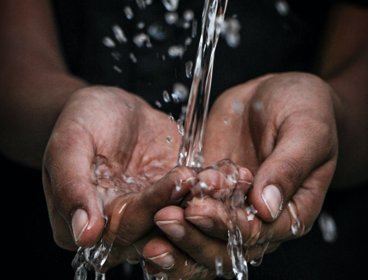Her main areas of research have included climate change and how we manage our use of natural resources. Formerly, Judith acted as an advisor to the World Bank on water privatisation and still sits as a board member on the UN Secretary General’s Advisory Board on Water amd Sanitation.
Judith used her Presidential Speech at the Sociey's AGM in 2014 to highlight the challenges facing global water provision. We spoke to Judith about the water challenges we are currently facing.
Where did your interest in water security come from?
It really started in my student days when, being taught location theory, we were told that water was a ubiquitous resource and was not considered as an industrial location factor. This went against my experience of school fieldwork in the East Midlands where the historic industries – lace, hosiery, dyeing, power generation – were all highly water dependent. So, as a post-graduate, I embarked upon research into the industrial demands for water, about which there was remarkably little systematic knowledge at the time. From this rather small seed grew a research journey looking at many different aspects of water, environmental regulation, resource management and, most recently, the relationship between water and climate change.
In what ways has water security come to the forefront of political agenda?
Few academics or social commentators can doubt the political importance of water. It is now commonplace for international organisations, such as the Organisation for Economic Co-operation and Development (OECD), to see water security as a key policy challenge and to argue that without significant reform of water and water-related policies, the outlook for water is pessimistic. Water is now acknowledged to play a pivotal role in sustainable development, human health and environmental protection. The United Nations (UN) Secretary-General, Ban Ki-moon, certainly expressed these sentiments when speaking at last year’s Water Summit in Budapest (Ki-moon, 2013), and the World Economic Forum (WEF, 2013) continues to regard water security as one of the key risks facing the global economy.
From a young age we are taught that water can neither be created nor destroyed; it is part of a system. How is it therefore that we can be ‘water insecure’ at all?
Recently I came across an article by Debaere, making just such a point:
The world as a whole is not running out of water. For one, the hydrologic cycle of evaporation makes fresh water a finite, but renewable global resource. In addition, there are enormous quantities of water available, in the order of trillions of gallons of water per capita. However . . .
Debaere (2014)
The key word in this quotation is ‘however’. Debaere’s ‘however’ relates to the clear geographically uneven distribution of water resources and to spatial variations in the demands put upon them, but this is only part of the story. We also need to consider the priority governments (national, regional and local) put on investments in water resources and services, institutional arrangements and governance systems before we can even start to understand why millions of people lack even basic water services and why water security, in all its dimensions, is regarded as such a challenge. A challenge which is likely to be exacerbated as water demands increase with population growth, changing food consumption patterns, urbanisation and industrialisation.
What other common misnomers are there about water security?
On paper, the UN Millennium Development Goal (MDG) of reducing by half the number of people without access to an improved water source has been met, except in sub-Saharan Africa. But this still means that some 780 million people are living without access to an improved water source and the absolute number of people in urban areas without such access has actually risen since 1990; investments in extending the service have failed to keep pace with city growth (OECD, 2012). Moreover, and crucially, an improved water source does not mean that the water is safe or that the supply is continuous. It is estimated that over 2 billion people lack safe water, even though this was defined as a fundamental human right by the UN in 2010 (Payen, 2014). For many years now the United Nations Secretary General Advisory Board (UNSGAB) has been pointing out that we cannot just assume that ‘improved’ water sources are safe. This has also just been acknowledged by the WHO-UNICEF Joint Monitoring Programme, which estimated that 1.8 billion people use drinking water which suffers from faecal contamination (JMP, 2014).
What does the future picture of water security look like?
On current demand trends, problems of water stress are likely to become significantly worse over time. The OECD projected that, by 2050, 40% of the population, some 3.9 billion people, will be dependent on water stressed river basins and some analysts argue that with those relying on ground water sources, 50% of the world’s population will be facing water scarcity problems. Other resource issues arise from the continued neglect of waste water treatment (over 80% of wastewater is discharged untreated) and from population growth in flood risk areas (Corcoran et al, 2010). Such resource issues are likely to be exacerbated by climate change, with the Intergovernmental Panel on Climate Change predicting increased precipitation in high latitudes, decreasing precipitation in the already dry regions and more frequent extreme events (IPCC, 2013).
This is all making for quite depressing reading…
It has to be acknowledged that some countries have done an enormous amount to reform water policies and management practices to provide their people with access to basic water services. Singapore, for example, is recognised as a model city for good water management, with integrated land and water planning and extensive water reuse; so-called NEWater (treated waste water) currently meets 30% of Singapore’s needs. Other countries, such as South Africa, have undertaken water law reform, still others (for example Australia and Chile) have introduced water markets, and some have made enormous investments to provide water services to their citizens.
Some would say that in identifying the problem we are half way towards solving it. Do you agree?
Simply recognising the scale of the challenge is not enough. Practical work has to be done to demonstrate the costs and risks of inaction, on feasible and implementable pathways to achieve water security and on the economic geography of water security (where, when and how to invest in improved security). Such work has recently started under the auspices of the OECD and the Global Water Partnership, which brings together top-level policymakers with academic researchers to provide a robust evidence base on the impacts of water insecurity and the potential pathways for change. It can only be hoped that when this work is published in 2015 it will act to change attitudes and shift practices towards a more sustainable water future.
References
-
Corcoran, E. Nellemann, C. Naker, E. Bos, R. Osborn, D. and Savelli, H. eds (2010) Sick water? The central role of wastewater management in sustainable development, a rapid response assessment United Nations Environment Programme, UN-HABITAT, GRID-Arendal
-
Debaere, P. (2014) ‘The global economics of water: is water a source of comparative advantage’ in American Economic Journal: Applied Economics 6 pp32–48
-
IPCC (2013) Fifth assessment report – climate change 2013: the physical science basis
-
JMP (2014) Progress on drinking water and sanitation: 2014 update WHO-UNICEF Joint Monitoring Programme for Water and Sanitation
-
Ki-Moon, B. (2013) Secretary-General’s opening remarks at Budapest Water Summit, Budapest, Hungary, 8 October 2013
-
OECD (2012) OECD environmental outlook to 2050: the consequences of inaction, OECD Publishing, Paris
-
Payen, G. (2014) The end of underestimating the global needs for safe drinking water: the 2014 breakthrough, UNSGAB
-
WEF (2013) Global risks 2011 6th edn
Links
Judith was interviewed in June 2014.



